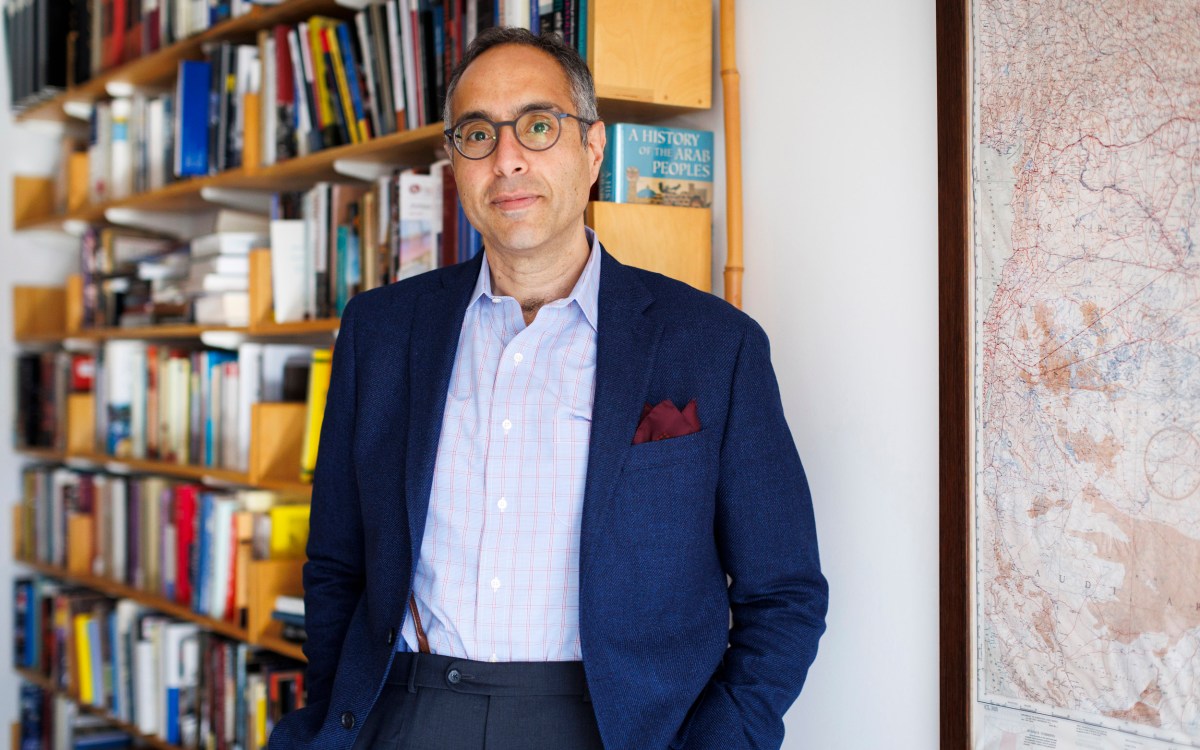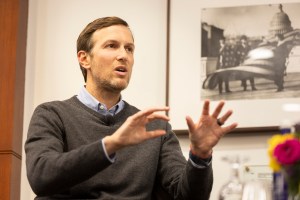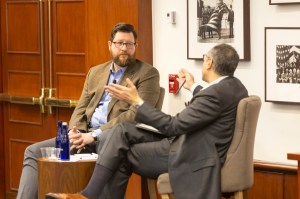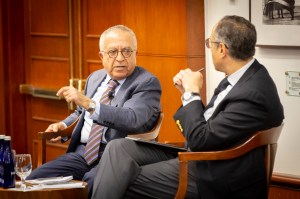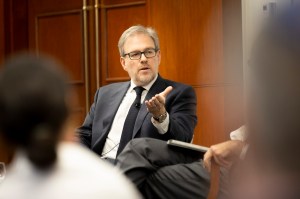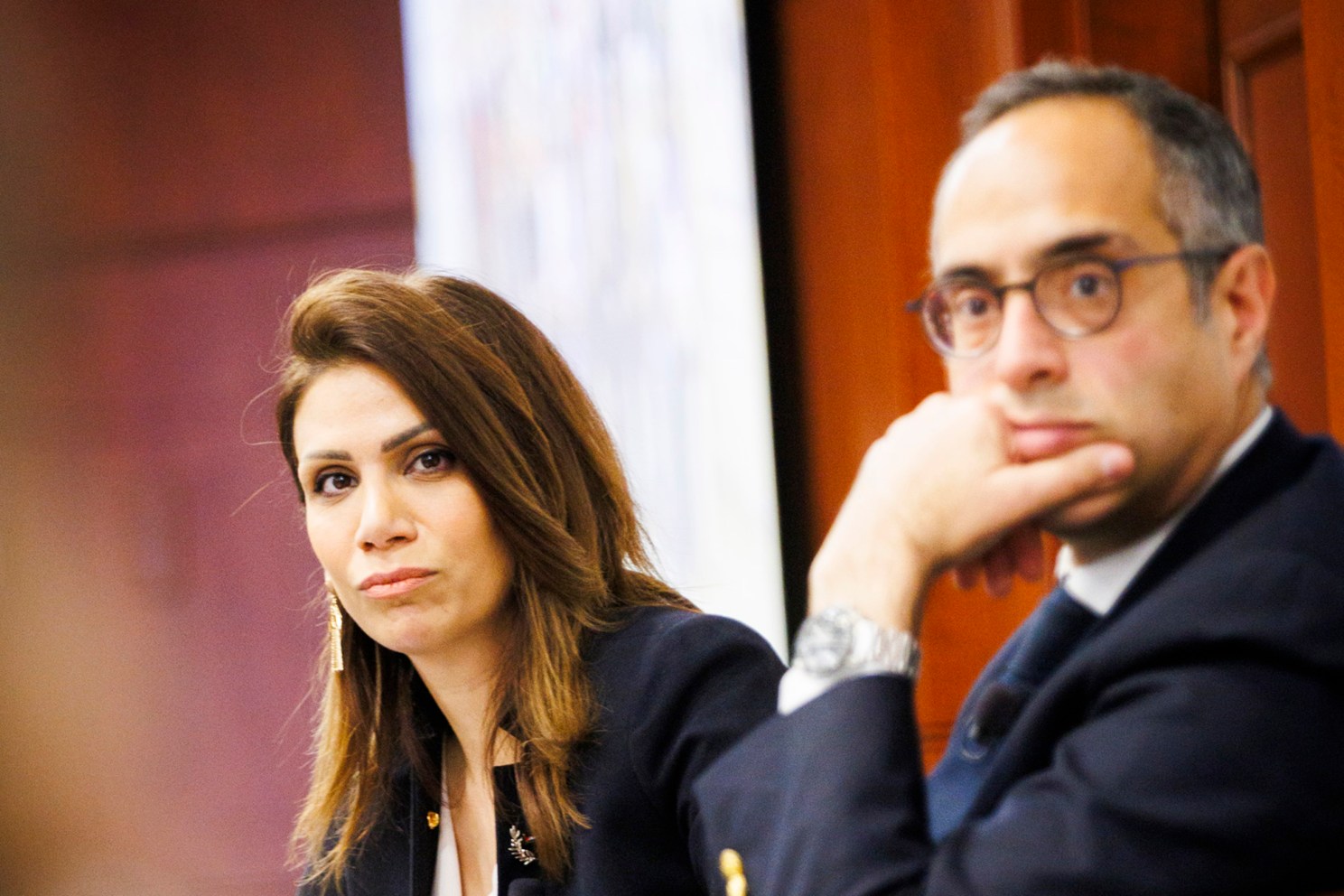
Dalal Saeb Iriqat and Tarek Masoud.
Stephanie Mitchell/Harvard Staff Photographer
Palestinian scholar pressed on views of Hamas, Oct. 7 attack
Conversation with Kennedy School’s Masoud reflects wider tensions
When Tarek Masoud, the Ford Foundation Professor of Democracy and Governance and faculty director of the Middle East Initiative at Harvard Kennedy School, announced that he would host a series of talks this semester about the Israeli-Palestinian conflict, he said his goal was to show that having hard conversations about hard subjects is an essential part of higher education.
Masoud’s March 7 talk with Dalal Saeb Iriqat, a controversial Palestinian scholar, demonstrated that that ambitious objective can be even more uncomfortable than it sounds.
During a sometimes tense conversation, Iriqat defended her social media claim that Hamas’ Oct. 7 terror attack against Israel was part of the “normal human struggle 4 #Freedom” and that Palestinians “will never forgive” Israel for “making us take their children and elderly as hostages.” More than 1,200 people were killed in the attack and more than 200 were taken hostage.
In the conversation with Masoud, she said that her support for the Palestinian people should not be misinterpreted as justifying violence. Instead, her views are “a reflection of 76 years of apartheid, of Israeli military occupation, of settler colonialism, of [land] confiscations,” and of “extrajudicial killing.”
Asked by Masoud about the role of Hamas in the violence and suffering in Gaza today, Iriqat responded that the focus on the terrorist group is a “fig leaf” that is being used by Prime Minister Benjamin Netanyahu and Israel’s right-wing government to hold onto power, and asserted that “biased” Western journalists are working with Israel to misrepresent the conflict. She also equated Israel’s military response in Gaza, which according to the Gaza health ministry has left more than 30,000 people dead, to the Holocaust, a comparison with which Masoud said many people would “take issue.”
Iriqat’s visit, under heavy security, came a month after critics of the decision to invite her described her as a radical who blamed Israel for the Oct. 7 attack. In a statement, HKS Dean Douglas Elmendorf called her views “abhorrent.”
Masoud responded to the criticism on LinkedIn, saying that while he thought her opinion about Israel was “incorrect,” he felt it was important to understand why she holds that view. “Given that it’s not a fringe belief in that part of the world, I think we have to grapple and argue with it,” he wrote.
Iriqat rejected the notion that some Palestinians object to any Israeli presence at all in Gaza, and claimed that Hamas would agree to a two-state solution.
“You could forgive an Israeli for thinking that commitment was not very credible given what happened on Oct. 7,” Masoud retorted. “It sounds like you’re saying, ‘Look, Oct. 7 happened because you’re denying us our freedom. Give us our freedom and Oct. 7 won’t happen anymore.’”
Some attendees left the event early, others pushed back on Iriqat, who faulted Israel for the lack of a cease-fire, saying that Netanyahu could end the conflict by withdrawing his forces from the occupied territories.
During the audience Q&A, one listener withdrew his question, saying he no longer believed in Iriqat’s “integrity.” Others spoke their minds, including Ely Sandler, a research fellow at the Belfer Center.
“As far as I can tell from the reaction of many in the room, people have come in very sympathetic to your cause,” Sandler said. “And while they might be sympathetic to your cause, they have left not sympathetic to you. So how can we … make people understand what’s going on in Gaza without making it combative?”
“I’m not here to win arguments,” Iriqat said. “I’m here to try to address your brain and to provoke the thinking of everyone to try to think more, learn more.”
“Please, everybody! Please help me,” said Masoud. “Because I’ve been trying to tell the world that we can have these conversations at Harvard like adults, and we’re going to do it. We’re going to succeed.”



